Cleethorpes Working Men's club could ditch 'men' to stay relevant
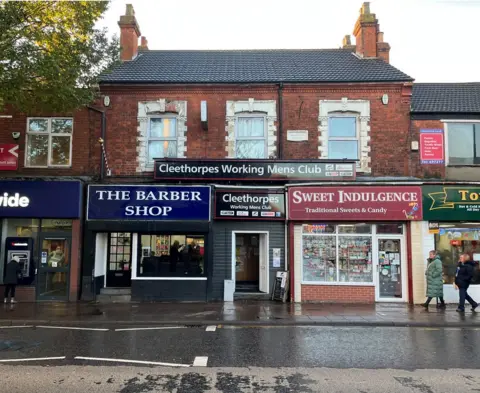 Kevin Shoesmith/BBC
Kevin Shoesmith/BBCBritain's working men's clubs have been a bastion of the entertainment scene for decades, providing cheap beer for their members and a stage for emerging acts. With the number of venues represented by the Club & Institute Union in sharp decline, BBC News visited one club where the management is considering a major change in its fight to remain open.
The plaque fixed onto an Anaglypta-papered wall denotes the late Mick Steer's "spot", right next to the fire escape.
The door has been left ajar, funnelling an icy breeze into the bar where a small group of members sup pints. From the message on the plaque, Mick - a former president of this club - would not have been impressed.
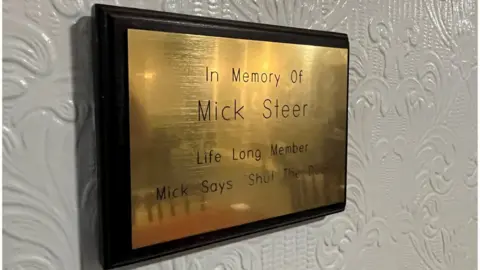 Kevin Shoesmith/BBC
Kevin Shoesmith/BBC"Uncle Mick was known for telling people to 'shut that door', so it's on his plaque," laughs Luke Steer, 37, one of two nephews working to keep the club open.
"He was not a man to mess around."
Cleethorpes Working Men's Club started life as a Royal British Legion club in the 1950s, before morphing into a working men's club in the 1990s. But, like many others, this traditional club is facing extinction.
The presence of "big characters" like Mick, now lost to time, is keenly felt.
It also partly serves to explain why times are so tough, with Luke's brother Tom Steer, 34, the club's vice president, telling me eight regulars had died in the past few years.
He adds: "Clubs like this are a dying breed."
 Kevin Shoesmith/BBC
Kevin Shoesmith/BBCLuke adds: "This club has lost some big-hitters. Guys would tend to stay here all day, enjoying a few drinks.
"Nowadays, people have their man caves. They buy their beer cheaply from supermarkets."
Outside, a sign promotes alcohol deals and a weekly "curry and pint" night. A local band is booked for the weekend. But the brothers know they can't compete with the supermarkets on prices.
Mandy Allison, the secretary and bar manager, tells me takings had dropped between 60-70% in the past year alone.
"I've been here eight years and never known it this bad," she tells me.
However, nobody on the committee is prepared to throw in the towel just yet.
A recent online fundraising appeal which was set up to buy the committee some extra time, mustered nearly £4,000 in just a few days.
"Without that, we'd have closed by Christmas," says Tom. "People ask us, 'Is it really that bad?' We're doing all we can, but they need to come down and support the club."
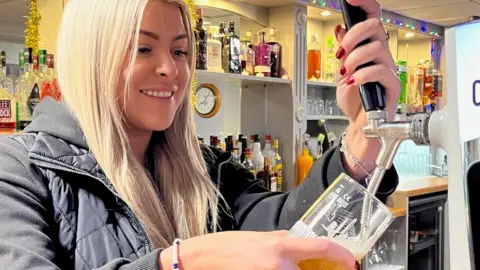 Kevin Shoesmith/BBC
Kevin Shoesmith/BBCIn the entrance hall, a money box and a signing-in register gathers dust. I see there are few recent entries.
"We used to ask members to pop £1 in the tin when they signed guests in," says Tom.
"Now, I'll be honest with you, we're just grateful to get people through the door."
Statistics show the scene in Cleethorpes is replicated in towns and cities across the region.
During their heyday in the 1970s, the Club & Institute Union (CIU) represented about 4,500 such venues. Now, that number is down to 1,200.
The number of licensed clubs - which includes working men's clubs, social clubs and nightclubs - across Yorkshire and the Humber has fallen by a quarter in the past decade.
There were 755 clubs as of March 2023, a fall of 25% from March 2013 when there were 1,005, according to the Office for National Statistics.
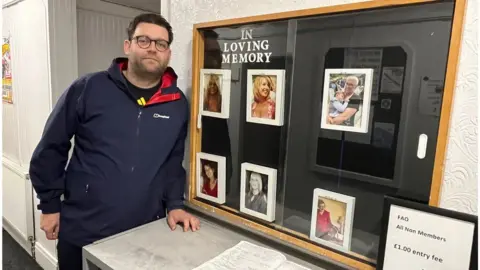 Kevin Shoesmith/BBC
Kevin Shoesmith/BBCThe Steer brothers - along with their 70-year-old father Pat, the current president - concede it may be time for change.
The club is currently full of blokeish humour. On a wall outside, in the smoking area, is a joke involving toilet seats and barmaids, while a sign on the bar warns unattended children "will be given a Red Bull, Skittles and taught how to swear".
Luke thinks the club may require rebranding.
"The place doesn't have windows, just the door at the front and the door at the back," he says.
"People often call it 'the bunker'. Maybe we could call it The Bunker?"
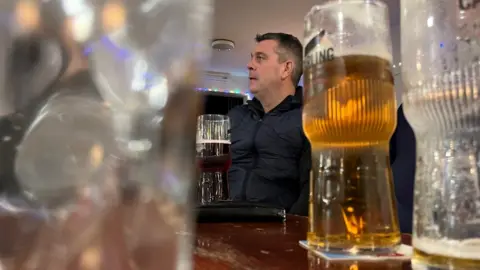 Kevin Shoesmith/BBC
Kevin Shoesmith/BBCBut Tom thinks the committee may have to go further, redressing the obvious gender imbalance in the name.
"The whole 'working men's' thing might be putting some women off," he admits.
Ken Green, general secretary of the Club & Institute Union, says members voted in April to remove reference to "working men" from the title of its conference.
He says: "Only about 40% of our members still call themselves working men's clubs. I can see why it could be off-putting to women."
Mr Green believes the Covid pandemic served as the final nail in the coffin for many clubs.
"A lot of members got used to staying at home and not socialising," he says.
"I also think the younger element now go out once a week, on a Friday night, and blow £100. In my younger years, I was at the club five times a week."
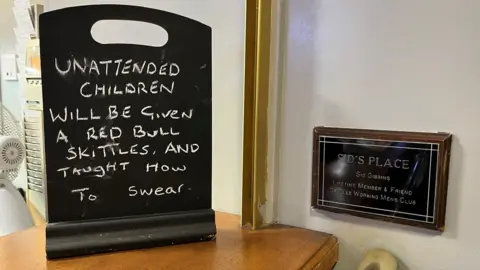 Kevin Shoesmith/BBC
Kevin Shoesmith/BBC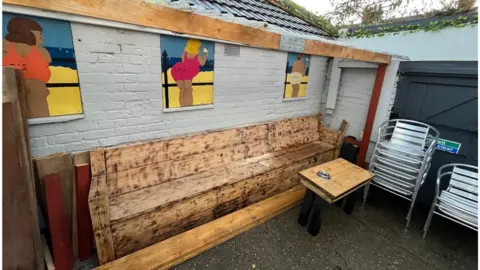 Kevin Shoesmith/BBC
Kevin Shoesmith/BBCDespite dwindling numbers, members in Cleethorpes still talk fondly of their club's "friendly atmosphere".
On a nearby table, Garry "Bulldog" Spencer, 60, chats with a group of his friends. He tells me he's been coming here "30, maybe 40 years".
"It's the camaraderie that has kept me here," he says. "It's good, working class people having a drink together."
Garry's friend, Chris Leach, 46, a scaffolder originally from Middlesbrough, says he met his wife here 21 years ago when he was working in the town.
"Families all know each other," he adds.
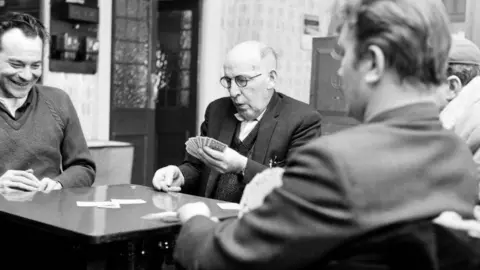 Mirrorpix/Getty Images
Mirrorpix/Getty ImagesBut the men lament the past - a time when the place was, to quote Chris Leach, "absolutely bouncing".
"On a Friday night, you'd struggle to get a seat," he adds.
Looking towards his Uncle Mick's plaque, Luke tells me "there's not a chance" they will give up on the club.
"We will fight to the bitter end," he adds.

Follow BBC East Yorkshire and Lincolnshire on Facebook, X (formerly Twitter), and Instagram. Send your story ideas to [email protected]
